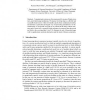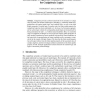345 search results - page 7 / 69 » Kripke models for classical logic |
AIEDAM
1999
13 years 7 months ago
1999
Intelligent agents must update their knowledge base as they acquire new information about their environment. The modal logic S5n has been designed for representing knowledge bases...
WADT
2004
Springer
14 years 29 days ago
2004
Springer
Abstract. Computational systems are often represented by means of Kripke structures, and related using simulations. We propose rewriting logic as a flexible and executable framewo...
AML
2002
13 years 7 months ago
2002
For a classical theory T, H(T) denotes the intuitionistic theory of T-normal (i.e. locally T) Kripke structures. S. Buss has asked for a characterization of the theories in the ra...
FOSSACS
2008
Springer
13 years 9 months ago
2008
Springer
Coalgebras provide a uniform framework for the semantics of a large class of (mostly non-normal) modal logics, including e.g. monotone modal logic, probabilistic and graded modal l...
LOGCOM
2006
13 years 7 months ago
2006
An intuitionistic, hybrid modal logic suitable for reasoning about distribution of resources was introduced in [14, 15]. The modalities of the logic allow us to validate propertie...


